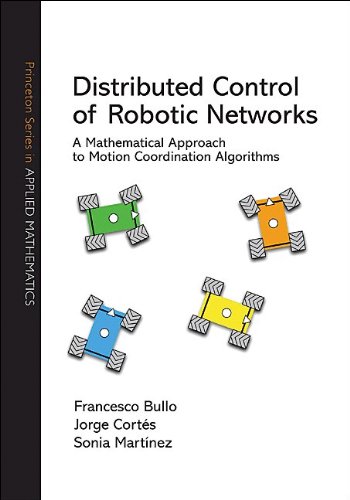
Distributed Control of Robotic Networks
by Francesco Bullo, Jorge Cortes, Sonia Martinez
Publisher: Princeton University Press 2009
ISBN/ASIN: 0691141959
ISBN-13: 9780691141954
Number of pages: 323
Description:
This self-contained introduction to the distributed control of robotic networks offers a distinctive blend of computer science and control theory. The book presents a broad set of tools for understanding coordination algorithms, determining their correctness, and assessing their complexity; and it analyzes various cooperative strategies for tasks such as consensus, rendezvous, connectivity maintenance, deployment, and boundary estimation.
Download or read it online for free here:
Download link
(10MB, PDF)
Similar books
 A Course in H-infinity Control Theory
A Course in H-infinity Control Theoryby Bruce A. Francis - Springer
An elementary treatment of linear control theory with an H-infinity optimality criterion. The systems are all linear, timeinvariant, and finite-dimensional and they operate in continuous time. The book has been used in a one-semester graduate course.
(17589 views)
 Applications of Nonlinear Control
Applications of Nonlinear Controlby Meral Altinay - InTech
A trend of investigation of Nonlinear Control Systems has been present over the last few decades. This book includes topics such as Feedback Linearization, Lyapunov Based Control, Adaptive Control, Optimal Control and Robust Control.
(12599 views)
 Control Engineering: An introduction with the use of Matlab
Control Engineering: An introduction with the use of Matlabby Derek Atherton - BookBoon
The book covers the basic aspects of linear single loop feedback control theory. Explanations of the mathematical concepts used in classical control such as root loci, frequency response and stability methods are explained by making use of MATLAB.
(16803 views)
 Constructive Nonlinear Control
Constructive Nonlinear Controlby R. Sepulchre, M. Jankovic, P. Kokotovic - Springer
Several streams of nonlinear control theory are directed towards a constructive solution of the feedback stabilization problem. Analytic, geometric and asymptotic concepts are assembled as design tools for a wide variety of nonlinear phenomena.
(16088 views)